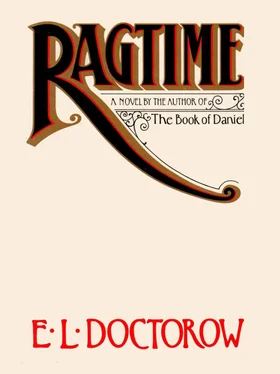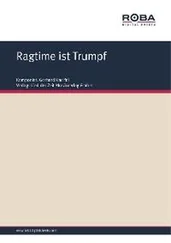Edgar Doctorow - Ragtime
Здесь есть возможность читать онлайн «Edgar Doctorow - Ragtime» весь текст электронной книги совершенно бесплатно (целиком полную версию без сокращений). В некоторых случаях можно слушать аудио, скачать через торрент в формате fb2 и присутствует краткое содержание. Жанр: Современная проза, на английском языке. Описание произведения, (предисловие) а так же отзывы посетителей доступны на портале библиотеки ЛибКат.
- Название:Ragtime
- Автор:
- Жанр:
- Год:неизвестен
- ISBN:нет данных
- Рейтинг книги:4 / 5. Голосов: 1
-
Избранное:Добавить в избранное
- Отзывы:
-
Ваша оценка:
- 80
- 1
- 2
- 3
- 4
- 5
Ragtime: краткое содержание, описание и аннотация
Предлагаем к чтению аннотацию, описание, краткое содержание или предисловие (зависит от того, что написал сам автор книги «Ragtime»). Если вы не нашли необходимую информацию о книге — напишите в комментариях, мы постараемся отыскать её.
Ragtime — читать онлайн бесплатно полную книгу (весь текст) целиком
Ниже представлен текст книги, разбитый по страницам. Система сохранения места последней прочитанной страницы, позволяет с удобством читать онлайн бесплатно книгу «Ragtime», без необходимости каждый раз заново искать на чём Вы остановились. Поставьте закладку, и сможете в любой момент перейти на страницу, на которой закончили чтение.
Интервал:
Закладка:
19
But Ford’s achievement did not put him at the top of the business pyramid. Only one man occupied that lofty place.
The offices of the J. P. Morgan Company were at 23 Wall Street. The great financier came to work one morning dressed in a dark blue suit, a black overcoat with a collar of lamb’s wool and a top hat. He affected fashions slightly out of date. When he stepped out of his limousine the car robe fell around his feet. One of the several bank officers who had rushed out to meet him disentangled the robe and hung it over the robe rail on the inside of the door. The chauffeur thanked him profusely. Somehow the speaking tube had come off its hook and another officer of the bank replaced it. In the meantime Morgan had marched into the building, assistants, aides and even some of the firm’s customers circling him like birds. Morgan carried a gold-headed cane. He was at this time in his seventy-fifth year of life — a burly six-footer with a large head of sparse white hair, a white moustache and fierce intolerant eyes set just close enough to suggest the psychopathology of his will. Accepting the obeisances of his employees, he strode to his office, a modest glass-paneled room on the main floor of the bank where he was visible to everyone and everyone to him. He was helped with his hat and coat. He was wearing a wing collar and an ascot. He sat down behind his desk, and ignoring the depositors’ accounts which were usually the first thing he looked at, said to his aides I want to meet that tinkering fellow. What’s his name. The motorcar mechanic. Ford.
He had sensed in Ford’s achievement a lust for order as imperial as his own. This was the first sign given to him in some time that he might not be alone on the planet. Pierpont Morgan was that classic American hero, a man born to extreme wealth who by dint of hard work and ruthlessness multiplies the family fortune till it is out of sight. He controlled 741 directorships in 112 corporations. He had once arranged a loan to the United States Government that had saved it from bankruptcy. He had single-handedly stopped the panic of 1907 by arranging for the importation of one hundred million dollars in gold bullion. Moving about in private railroad cars or yachts he crossed all borders and was at home everywhere in the world. He was a monarch of the invisible, transnational kingdom of capital whose sovereignty was everywhere granted. Commanding resources that beggared royal fortunes, he was a revolutionist who left to presidents and kings their territory while he took control of their railroads and shipping lines, banks and trust companies, industrial plants and public utilities. For years he had surrounded himself with parties of friends and acquaintances, always screening them in his mind for the personal characteristics that might indicate less regard for him than they admitted. He was invariably disappointed. Everywhere men deferred to him and women shamed themselves. He knew as no one else the cold and barren reaches of unlimited success. The ordinary operations of his intelligence and instinct over the past fifty years had made him preeminent in the affairs of nations and he thought this said little for mankind. Only one thing served to remind Pierpont Morgan of his humanity and that was a chronic skin disease that had colonized his nose and made of it a strawberry of the award-winning giant type grown in California’s wizard of horticulture Luther Burbank. This affliction had come to Morgan in his young manhood. As he grew older and richer the nose grew larger. He learned to stare down people who looked at it, but every day in his life, when he arose, he examined it in the mirror, finding it indeed loathsome but at the same time exquisitely satisfying. It seemed to him that every time he made an acquisition or manipulated a bond issue or took over an industry, another bright red pericarp burst into bloom. His favorite story in literature was a tale of Nathaniel Hawthorne’s entitled “The Birthmark,” which told of an extraordinarily lovely woman whose beauty was perfect except for a small birthmark on her cheek. When her husband, a natural scientist, made her drink a potion designed to rid her of this imperfection, the birthmark disappeared; but as its last faintest outline vanished from her skin and she was perfect, she died. To Morgan, the disfigurement of his monstrous nose was the touch of God upon him, the assurance of mortality. It was the steadiest assurance he had.
Once, years before, he had arranged a dinner party at his residence on Madison Avenue in which his guests were the dozen most powerful men in America besides himself. He was hoping the collected energy of their minds might buckle the walls of his home. Rockefeller startled him with the news that he was chronically constipated and did a lot of his thinking on the toilet. Carnegie dozed over his brandy. Harriman uttered inanities. Gathered in this one room the business elite could think of nothing to say. How they appalled him. How his heart quaked. He heard through his brain the electric winds of an empty universe. He ordered the servants to place garlands of laurel on every pate and crown. Without exception the dozen most powerful men in America looked like horse’s asses. But the pomposity that had accrued with their wealth persuaded them that perhaps these ridiculous vines held some significance. No one of the women thought to laugh. They were hags. They sat on their large draped behinds, breasts drooping under their décolletage. Not an ounce of with among them. Not a light in their eyes. They were the loyal wives of great men and the hard pull of rampant achievement ha sucked the life out of their flesh. Revealing nothing of his feelings Morgan hid behind his fierce and doughty expression. A photographer was summoned to make a picture. There was a flash — the solemn moment was recorded.
He fled to Europe, embarking on the White Star liner Oceanic . He had combined the White Star Line, the Red star Line, the American, Dominion, Atlantic Transport and Leyland lines into one company numbering 120 ocean-going ships. He despised competition no less on the seas than on land. He stood at night by the ship’s rail, hearing the heavy sea, feeling its swell but not seeing it. The sea and the sky were black and indistinguishable. A bird, some sort of gull, appeared from the blackness and lighted on the rail a few feet from him. Perhaps it had been attracted by his nose. I have no peers, Morgan said to the bird. It seemed an indisputable truth. Somehow he had catapulted himself beyond the world’s value system. But this very fact lay upon him an awesome responsibility to maintain the illusions of other men. For his Episcopal brethren he would build a cathedral, St. John the Divine, on West 110th Street in New York. For his wife and grown children he would continue to provide an image of domestic stolidity. And for the shake of the country he would live in as grand a style as he could summon, dining with kings, or buying art in Rome and Paris, or consorting with beautiful companions at Aix-les-Bains.
Morgan had kept his vows. He spent six months of every year in Europe, moving in majesty from one country to another. The holds of his ships were filled with collections of paintings, rare manuscripts, first editions, jades, bronzes, autographs, tapestries, crystal. He looked into the eyes of Rembrandt burgher and Greco prelates as if to find kingdoms of truth that would bring him to his knees. He fingered the illustrated texts of rare Bibles of the Middle Ages as if to pick up dust from the City of God. He felt if there was something more than he knew, it lay in the past rather than in the present, of whose total bankruptcy of existence he was confident. He was the present. He employed curators to find him art and scholars to teach him of ancient civilizations. He beat his way back through the Flemish tapestries. He fondled Roman statuary. He strode through the Acropolis kicking the loose stones. His desperate studies settled, inevitably, on the civilizations of ancient Egypt, wherein it was taught that the universe is changeless and that death is followed by the resumption of life. He was fascinated. His life took a new turn. He funded Egyptian archaeological expeditions of the Metropolitan Museum. He followed the reclamation from the dry sands of every new stele, amulet and canopic jar containing viscera. He went to the valley of the Nile where the sun never fails to rise nor the river to flood its banks. He studied the hieroglyphs. One evening he left his hotel in Cairo and rode seven miles on a special streetcar to the site of the Great Pyramid. In the clear blue light of the moon he heard from a native guide of the wisdom given to the great Osiris that there is a sacred tribe of heroes, a colony from the gods who are regularly born in every age to assist mankind. The idea stunned him. The more he thought about it the more palpably he felt it. It was upon his return to America that he began to think about Henry Ford. He had no illusions that Ford was a gentleman. He recognized him for a shrewd provincial, as uneducated as a piece of wood. But he thought he saw in Ford’s use of men a reincarnation of pharaohism. Not only that: he had studied photographs of the automobile manufacturer and had seen an extraordinary resemblance to Seti I, the father of the great Ramses and the best-preserved mummy to have been unearthed from the necropolis of Thebes in the Valley of the Kings.
Читать дальшеИнтервал:
Закладка:
Похожие книги на «Ragtime»
Представляем Вашему вниманию похожие книги на «Ragtime» списком для выбора. Мы отобрали схожую по названию и смыслу литературу в надежде предоставить читателям больше вариантов отыскать новые, интересные, ещё непрочитанные произведения.
Обсуждение, отзывы о книге «Ragtime» и просто собственные мнения читателей. Оставьте ваши комментарии, напишите, что Вы думаете о произведении, его смысле или главных героях. Укажите что конкретно понравилось, а что нет, и почему Вы так считаете.












